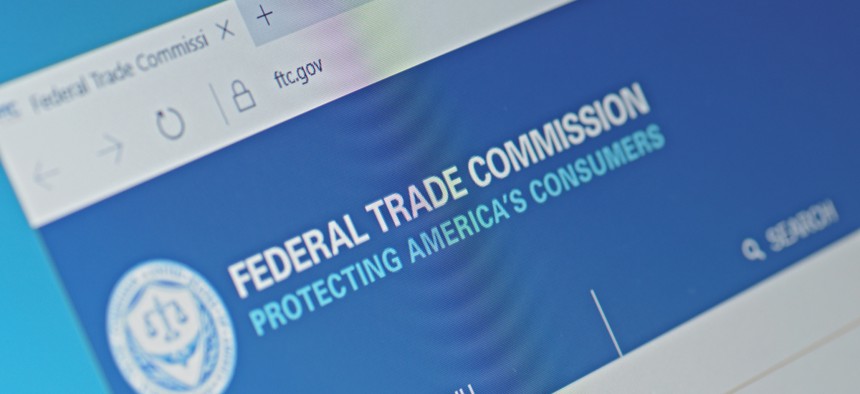The FCC Plans to Kill the Open Internet; Don’t Count on the FTC to Save It

g0d4ather/Shutterstock.com
The FTC does not have specialized expertise in telecommunications.
Scrapping the Federal Communication Commission’s (FCC’s) net neutrality rules will harm consumers and content creators, and the Federal Trade Commission (FTC) isn’t going to be able to stop it. As a commissioner at the FTC, I can vouch for the fantastic competition and consumer protection work our small agency does with its dedicated and hardworking staff. There are many things it is equipped to do well. But protecting the open internet is not one of them.
The FTC does not have specialized expertise in telecommunications. We don’t have engineers with technical experience in data network management practices. We don’t even have jurisdiction over common carriers. These are very real and significant limits to the effectiveness of our tools in ensuring that networks are open and free of harmful discrimination.
The United States has a specialized telecom agency with the expertise and technical capability to protect net neutrality and ensure an open internet. That agency is the Federal Communications Commission. The FCC spent years studying the open internet issue. It gathered data and input from market participants, academics, and public comments. Based on that record, the FCC concluded that rules were necessary to protect internet openness, which in turn promotes a “virtuous cycle,” which leads to more internet content, more innovation, better quality, and greater investment in broadband infrastructure. The DC Circuit US Court of Appeals upheld the FCC’s findings with respect to this “virtuous cycle.”
But now FCC Chairman Ajit Pai is proposingto abandon those rules. The idea is, apparently, that if we allow wireless and internet services providers (ISPs) to be the gatekeepers to all content on the internet and the speed at which we can access it, they will provide us with better, cheaper services. Of course, in reality big, powerful internet platforms will pay ISPs for fast lanes that smaller or mid-sized companies and entrepreneurs will not be able to access. Or ISPs, as in Spain and Portugal, may start offering confusing bundles of websites, just like cable packages. Or perhaps they will offer more expensive plans with higher speeds for certain websites. Who knows?
There is no need to worry though, net neutrality opponents say, because the ISPs will have to be transparent about what content they are offering and the speed at which they are offering it—and the FTC will be on watch to protect consumers and competitors from egregious conduct.
But after-the-fact enforcement by the FTC is not a substitute for clear preemptive rules. For one thing, the FTC’s mandate in the competition space is to “maintain competition.” I believe in the virtues of competition. But we cannot “maintain” competition that does not exist. The reality is that tens of millions of Americans have little or no choice when it comes to wireline broadband service. Those who oppose net neutrality rules often make the mistake of suggesting that market competition will limit discriminatory conduct and push ISPs to offer consumers better service. But that argument only makes sense if there is underlying market competition to begin with. Otherwise, it’s like saying your dog will protect your house when you don’t own a dog.
There are other problems with relying solely on the FTC. It can be costly, difficult, and time consuming to detect and prosecute discriminatory conduct–particularly for an agency like the FTC that lacks the FCC’s technical expertise in data network management. Let’s say that the FTC does detect harmful conduct by a dominant ISP, such as discrimination against a rival. And let’s say that the FTC has jurisdiction and legal authority to mount a challenge. (Already, we are making a number of rosy enforcement assumptions.) It might take years before the agency could get a court order halting the practice. During that time, the dominant ISP could continue to discriminate against its rival, potentially driving it out of business. Even if the FTC were ultimately to prevail, we couldn’t resurrect the dead rival. Nor could we go back in time and undo the harm to consumers or to the competitive evolution of the marketplace. At the end of the day, the dominant ISP might lose the antitrust suit and yet still wind up better off.
Some have suggested that FTC enforcement of “voluntary promises” by ISPs could substitute for clear open internet rules. But if ISPs were prepared, voluntarily, to commit to the principles in the FCC’s 2015 Open Internet Order, then why eliminate the rules in the first place? The answer is that the broadband ISPs know that they will be able to leverage their market power far more effectively if the only check on their behavior is after-the-fact enforcement by the FTC.
If anyone expects the FTC singlehandedly to be able to provide the net neutrality protections that Americans overwhelmingly support, let me disabuse them of that notion. We lack the tools, the expertise, and the resources to carry out such a charge on our own.
Years from now, when Americans demand to know why the government allowed powerful broadband ISPs to kill the open internet, I fear that the FTC may become a scapegoat. I have every confidence that our staff will work tirelessly to protect consumers as best they can using the tools we have.
It will not be enough. We are being set up to fail.
Terrell McSweeny is a commissioner of the US Federal Trade Commission. The views expressed herein are her own and do not represent those of the FTC or any other commissioner.
NEXT STORY: Why data chiefs need to be everywhere


